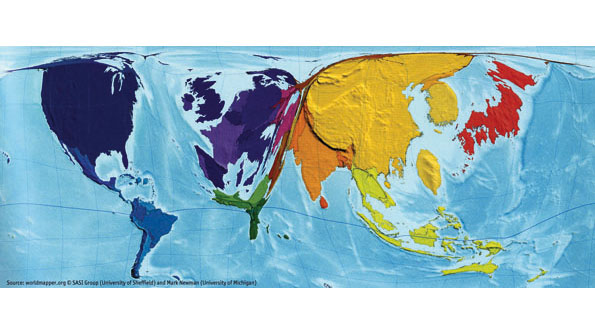
A map of the world distorted to depict projected shares of global GDP in 2015.
Economist piece.
Bob Zoellick, World Bank pres., says "2009 saw the end of what was known as the third world"--meaning the end of a distinct, separate part of the world that is aid-dependent and unimportant.
Is this a plausible notion? asks The Economist:
While the rich world stumbles out of recession, Asia, Africa and Latin America are accelerating and contributing more than ever to world output. Two fast-growing countries, Turkey and Brazil (“powers of the future”, says Iran’s president), struck a deal in May that was intended to break the deadlock over Iran’s nuclear programme. Though less than meets the eye, the agreement was still an intriguing case of emerging-nation diplomacy. And the football World Cup gets under way this week in South Africa, arguably the poorest country to host the event.
Yet at the same time, Mr Zoellick’s bank is not in any danger of going out of business.
The simpler argument, says the paper, is that the Third World dies when the division between First and Second Worlds ends in 1989 ("end of history").
But the world is still "binary," says the paper, noting that 1B ("bottom billion" live on less than $1.25 a day (basically one half of the one-third of the world's population in my Gap).
Can we at least still buy the dependency theory? Not when south-south trade (and south-BRIC trade) rises twice as fast as global trade.
But aren't these nations hopelessly in debt? Public debt in emerging economies is 40% of GDP and flat, while Old Core public debt was 75% of GDP in 2007 and rising toward 110% by 2015, says the IMF. So South Africa has a better credit rating than Greece.
Nice conclusion:
In 1826 the British foreign secretary, George Canning, boasted that he had “called the new world into existence to redress the balance of the old.” Now the third world has come into its own to redress the imbalances of the old. Canning and others also helped to transform the diplomatic architecture of Europe after the end of Napoleon. Far less has been done—in international financial institutions, in patterns of aid-giving and in diplomatic habits—to reflect the reality of the third world’s end.
As I've long argued: dependency theory turned on its head, and if that's not the end of history, then it's the end of Leninism.